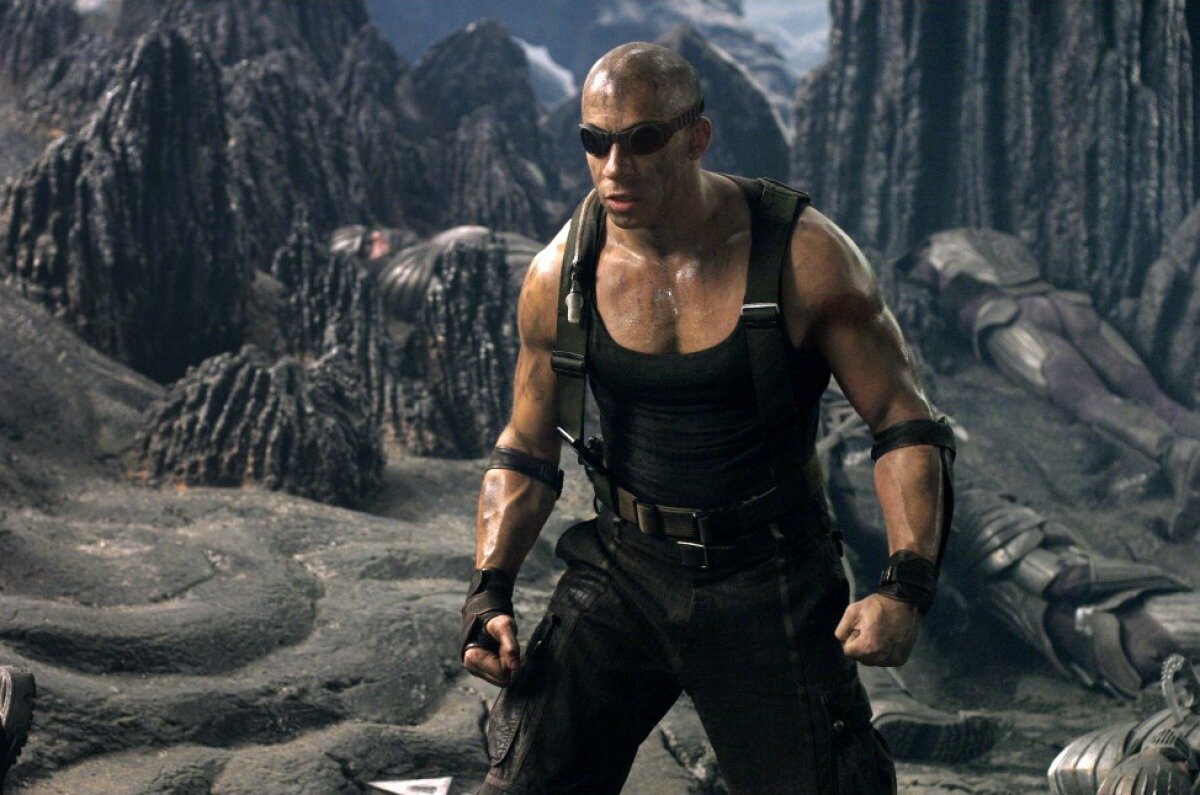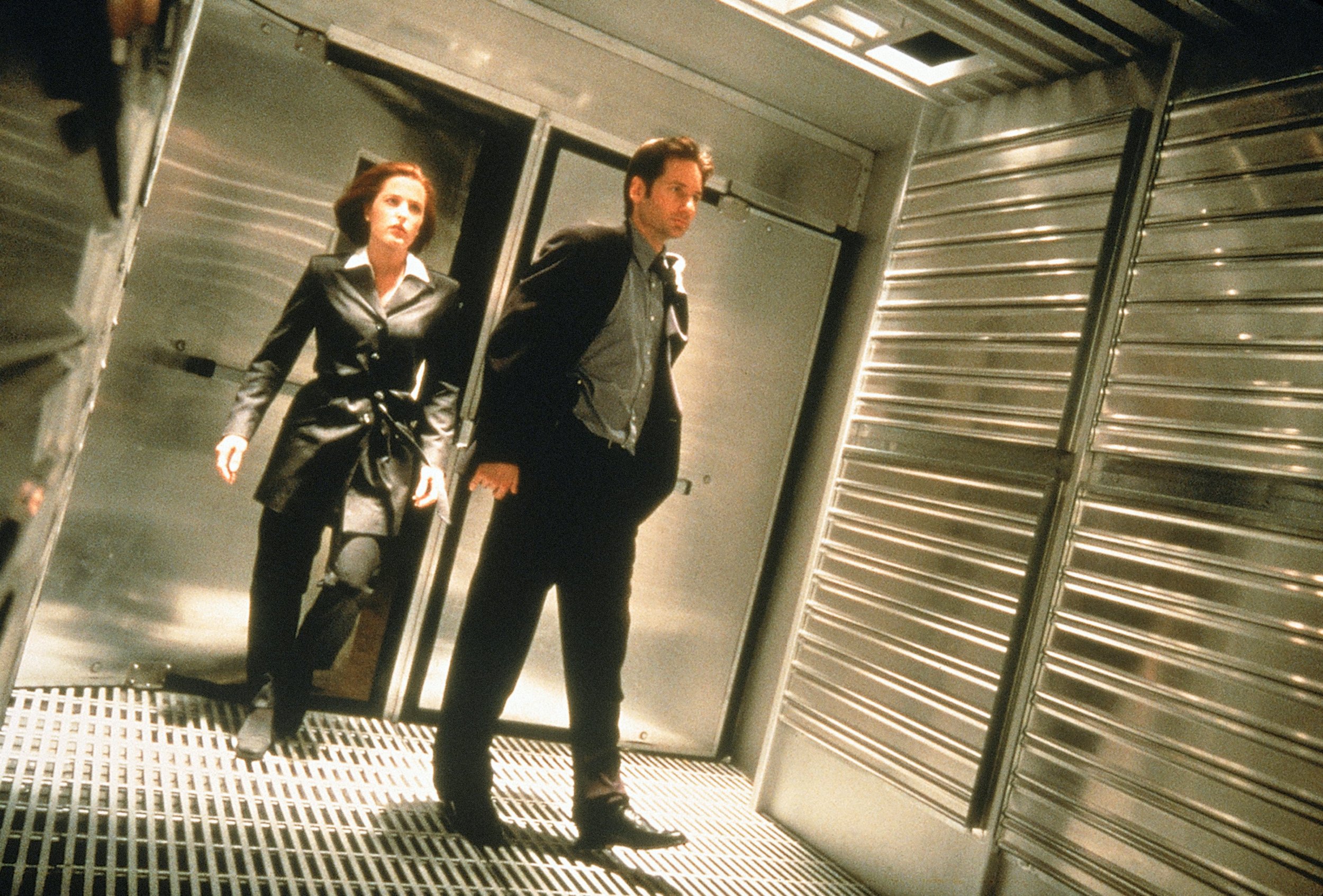Review: The Chronicles of Riddick (2004)
It’s hard to think of a film franchise that takes a harder left turn after the first film than The Chronicles of Riddick. In fact, if you watch Pitch Black simply as a modest B-movie throwback, the plot doesn’t beg for a sequel at all, much less one that takes place on as grand a scale as its sequel, The Chronicles of Riddick. But writer and director David Twohy and star Vin Diesel are simply too intrigued by the antihero, Richard B. Riddick, to leave well enough alone. Instead, they craft this ludicrous space opera as a paean to the mysterious allure of Riddick as a character. The result is both deeply silly and kind of awesome.
The Chronicles of Riddick is a rollicking space opera that riffs on the works of Edgar Rice Burroughs and Robert E. Howard, transforming the enigmatic criminal Riddick into a prophesied liberator and conqueror like John Carter or Conan the Barbarian. Working in the wake of the success of The Lord of the Rings trilogy and the Harry Potter series, the filmmakers attempt to cash into the fantasy craze of the early 2000s, which explains the film’s massive $120 million budget. The resulting swing to space fantasy is a bit discombobulating after the modest desert-set western throwback of Pitch Black, but also audacious and fun. It’s as if the sequel to A Fistful of Dollars had made Clint Eastwood’s Man with No Name the President of the United States. If you find that description intriguing instead of deeply stupid, The Chronicles of Riddick is likely to work for you.
The movie’s tone is undeniably strange. Several years after Pitch Black, it catches up with Riddick, who has been avoiding bounty hunters on desolate landscapes around the galaxy. After stealing the ship of a bounty hunter, he heads back to civilization and the planet Helion Prime, where he reconnects with Imam (Keith David), one of the survivors from Pitch Black. However, Riddick’s arrival on the planet coincides with the arrival of the Necromongers, a race of religious fanatics led by the Lord Marshal (Colm Feore) that have been conquering the galaxy and converting those they subjugate to their death-worshiping religion. The Necromongers seek purification through death; according to their religion, life is tainted, but death is clean. According to prophecy, there’s one man destined to stop them, and it turns out that man is Richard B. Riddick. Because of course the guy who dresses like a fitness instructor and who can see in the dark is the hero fated to save the universe from death-worshipping religious fanatics.
The plot takes Riddick to a prison planet where he meets up with an adult Jack (Alexa Davalos), who’s grown up and now goes by the name “Kyra.” Riddick also crosses paths with a mystical alien known as an Air Elemental, who happens to be played by Judi Dench, whom Diesel was reported to have requested when given the chance to choose his female opposite after the success of his recent movies in the early 2000s. As we follow Riddick escaping from bounty hunters, freeing prisoners, and fighting to take down the Necromonger Empire, we also check in with two plotting Necromongers, Vaako (Karl Urban) and Dame Vaako (Thandie Newton), who want to usurp the throne from the Lord Marshal. Jumping between these two narrative threads, the film has goofy action scenes, erotically-charged moments of scheming that play like a half-baked Macbeth, and more than enough exposition for an entire film series. You’d think such elements would be disastrous. And it is likely that these elements helped sink the film, as it bombed on release and became an infamous box office flop. But the movie is charming too.
If you can get past the clunky CGI and the strange tonal evolution from sci-fi western to space opera, you start to notice how much character this film has and how fond it is of not only Riddick as the central figure, but also the imaginative potential of the universe it’s set in. Despite their goofy name, the Necromongers are impressively designed, with a fleshed out ideology and religion. On each planet they conquer, they leave behind a massive four-headed statue, like a suped up statue of the Roman god Janus, who watches over the dead worlds they conquer like a gargoyle on a mausoleum. It’s a genuinely chilling image. The action scenes are also well-done. They lack the small-scale intrigue of the scenes in Pitch Black, opting more for sword fights and large scale battles than the run and hide moments of the first film. But they are also comprehensible, not yet giving into the shaky-cam aesthetics that would dominate action for a decade in the wake of Paul Greengrass’s Bourne films.
Most importantly, the film makes Riddick more fun, not less. Even as we learn more about his heritage and see him interact with the broader universe, the result is not a disenchantment of the character. If anything, the film makes him more intriguing, as he’s able to embody so many contradictory elements in a way that is usually impossible for Hollywood heroes. As well, while Vin Diesel is neither Hollywood’s most talented actor nor its charismatic movie star, his affection for Riddick is so obvious in his performance that it’s impossible not to enjoy watching him relish the material. Each duel or witty one-liner or moment of heroic fighting is a chance to watch a big movie star simply having fun on screen, which can be contagious.
The Chronicles of Riddick also doesn’t neuter Riddick or evaporate his dangerous side. He may be the prophesied hero to stop the Necromongers, but he doesn’t suddenly develop respect for the lives of others or lose his edge. Like Conan the Barbarian, he remains a violent man defined by his ability to use violence against those people and monsters worse than himself. As Judi Dench’s Air Elemental puts it, “In normal times, evil should be fought by good, but in times like this, well, it should be fought by another kind of evil.”
I wouldn’t go so far as to call Riddick evil, but he’s certainly not good. He’s a figure in-between, driven by anger, but not indifferent to mercy. Like its central antihero, The Chronicles of Riddick is a film stuck in-between conventional descriptions. It’s neither a great success, nor an uninteresting failure. It may have bombed at the box office, but there’s more intriguing design and charismatic storytelling here than in many successful franchise films that have come in the decades since its release. It may exist just on the precipice of failure, but sometimes the most idiosyncratic and interesting films are just a few missteps away from disaster.
6 out of 10
The Chronicles of Riddick (2004, USA)
Directed by David Twohy; written by David Twohy, based on characters created by Jim and Ken Wheat; starring Vin Diesel, Colm Feore, Keith David, Karl Urban, Thandie Newton, Alexa Davalos, Judi Dench, Linus Roache, Nick Chinlund, Yorick van Wageningen.



Take Out, Sean Baker’s debut feature co-directed by Shih-Ching Tso, reveals a strong authorial voice and anticipates the focus of many of Baker’s later features.